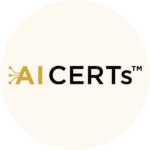
AI CERTS
6 months ago
Learn AI for HR Management: Enhancing Human Resources with Artificial Intelligence
With the growing complexity of HR functions, AI offers solutions that automate repetitive tasks, analyze employee data, and predict workforce needs. For HR professionals, learning AI enables them to harness these tools effectively, resulting in better talent acquisition, employee engagement, and organizational development.
Why Learning AI is Important for HR Management
With the growing complexity of HR functions, AI offers solutions that automate repetitive tasks, analyze employee data, and predict workforce needs. For HR professionals, learning AI enables them to harness these tools effectively, resulting in better talent acquisition, employee engagement, and organizational development.
AI-powered tools can assist in managing everything from recruitment to onboarding, performance tracking, and even employee satisfaction. For example, AI-driven analytics platforms can reveal insights from employee feedback, performance reviews, and engagement surveys, helping HR teams make data-informed decisions that improve the workplace environment.

Related Reading: Learn more about AI’s impact on HR transformation in Forbes’ article on Power of AI in HR.
Core Skills to Learn AI for HR Management
AI-driven HR requires a blend of technical and strategic skills. Here are some essential skills to focus on when learning AI for HR management:
1. Data Literacy and Interpretation
AI tools rely on data, making data literacy a foundational skill for HR professionals interested in AI. Data literacy involves understanding how to interpret, analyze, and apply data to drive decision-making. For HR, this could mean evaluating employee productivity trends, turnover rates, or engagement metrics.
2. Natural Language Processing (NLP)
NLP, a branch of AI that processes and interprets human language, is invaluable for HR functions like sentiment analysis and employee feedback interpretation. By learning the basics of NLP, HR professionals can understand how to analyze unstructured data, such as open-ended survey responses, social media posts, or exit interviews.
3. Machine Learning Basics for HR Applications
Machine learning (ML) enables HR teams to predict future trends based on historical data. HR professionals who learn the basics of ML can apply it to forecast hiring needs, assess turnover risks, or analyze factors contributing to employee engagement. Understanding ML allows HR managers to work closely with data scientists in creating and refining models that optimize HR functions.
4. Ethical AI and Compliance
As AI becomes more integrated into HR, ethical considerations such as bias prevention and compliance with data privacy laws like GDPR are crucial. Learning about ethical AI enables HR professionals to ensure AI systems remain fair and unbiased, protecting employee rights and upholding organizational integrity.
Real-World Applications of AI in HR Management
AI has diverse applications across HR functions, helping HR teams become more proactive and strategic. Here are some specific ways that AI can be used in HR management:
1. Recruitment and Talent Acquisition
AI-powered tools streamline recruitment by automating resume screening, assessing candidates’ cultural fit, and even conducting initial interviews. By using AI in recruitment, HR managers can evaluate a larger pool of candidates more efficiently and select those best suited for the role.
2. Employee Engagement and Sentiment Analysis
AI tools can analyze employee feedback and engagement data, identifying trends that inform HR teams about potential areas of improvement. Through sentiment analysis, AI tools interpret emotions in written feedback, allowing HR to gauge employee satisfaction and proactively address any issues that may arise.
3. Performance Management and Employee Development
AI helps HR teams monitor employee performance by tracking key performance indicators (KPIs) and identifying skill gaps. This data can be used to create personalized learning and development plans, helping employees grow within the company and meet organizational objectives.
4. Workforce Planning and Analytics
AI-driven workforce planning tools analyze internal data, such as employee turnover and skill requirements, along with external data, like labor market trends, to make strategic hiring and retention decisions. This helps HR teams ensure that their workforce remains agile and aligned with business goals.
Related Reading: Explore more about AI’s role in HR analytics on McKinsey’s report on workforce planning with AI.
Benefits of Learning AI for HR Management
Mastering AI skills offers numerous advantages for HR professionals, making it easier to manage people, optimize HR processes, and support strategic goals. Here’s how AI can benefit HR management:
1. Enhanced Efficiency and Productivity
AI-driven automation allows HR teams to handle repetitive tasks, such as screening resumes, scheduling interviews, and processing payroll. Automating these time-consuming tasks enables HR professionals to focus on more strategic responsibilities, boosting productivity.
2. Improved Decision-Making with Data-Driven Insights
By learning how to use AI analytics, HR professionals can gain actionable insights into employee performance, satisfaction, and turnover rates. This data-driven approach enables better decision-making, helping HR teams to identify trends, resolve challenges proactively, and support the organization's overall growth.
3. Personalized Employee Experiences
AI in HR makes it possible to tailor employee experiences. From personalized onboarding processes to customized learning paths, AI can create unique employee journeys that improve engagement and satisfaction, making employees feel valued and supported.
4. Enhanced Talent Retention and Development
AI provides valuable insights into employee behaviors, helping HR teams identify potential flight risks and create retention strategies. It also aids in developing personalized career development plans, which support talent retention by aligning employees' goals with organizational objectives.

Key Considerations for Implementing AI in HR
Before fully adopting AI into HR processes, it’s essential to consider certain factors to ensure successful implementation.
1. Ensuring Data Privacy and Security
Given the sensitivity of employee data, privacy and security are top priorities. AI-powered HR systems should comply with data protection regulations, ensuring that employees’ personal information is secure. This involves regularly updating security protocols and educating HR teams on best data management practices.
2. Mitigating Bias in AI Algorithms
Bias in AI algorithms is a significant concern, especially in recruitment and performance management. Learning AI for HR management should include strategies for identifying and addressing biases to create fair, unbiased AI models. This fosters a more inclusive workplace by ensuring that AI systems do not perpetuate discriminatory practices.
3. Collaborating with IT and Data Science Teams
Successful AI adoption in HR often requires collaboration with IT and data science teams. HR professionals should communicate their specific needs, such as features for recruitment or employee analytics, to these teams. This collaboration helps ensure that AI tools align with HR goals and are fully integrated into existing HR systems.
4. Continuous Learning and Adaptation
AI is constantly evolving, and staying updated on the latest developments is crucial. HR professionals should be prepared to continually learn and adapt, ensuring that their AI knowledge remains relevant and effective for emerging HR challenges and opportunities.
The Future of AI in HR Management
The future of AI in HR is bright, with more organizations expected to adopt AI technologies to drive their HR functions. Here are some trends likely to shape AI-driven HR:
- Expansion of Predictive Analytics for Workforce Planning: Predictive analytics will continue to be used to anticipate workforce needs, allowing HR to proactively prepare for changes in employee demand and skill requirements
Related Reading: Learn more about predictive modeling in HR from MIT Sloan’s article on predictive HR analytics.
- Increased Use of AI for Remote Employee Engagement: As remote work becomes more prevalent, AI will play a crucial role in assessing and managing remote employee engagement, offering real-time insights and suggesting interventions as needed.
- Growth in AI-Powered Learning and Development: AI will enable HR to deliver highly customized training programs that adapt to each employee’s learning pace, interests, and career goals, enhancing skill development across organizations.
With AI transforming HR, those who invest time to learn AI for HR management will be at the forefront of shaping modern, data-driven HR practices that enhance employee experience and improve organizational performance.